Let’s be honest here. As a brand, the success of One Direction has been phenomenal. In One Direction: This is Us, super producer Simon Cowell boasts about how it took him all of ten minutes to come up with the band, jamming five also-ran teenage X-Factor contestants into an also-ran X-Factor boy band that became a global pop culture juggernaut. Morgan Spurlock’s One Direction: This is Us is really nothing but a propaganda piece, a giant feature-length 3D pat on the back where a manufactured pop sensation are compared – not once, but twice – to The Beatles.
And there’s really nothing wrong with that. After all, this was never going to be an insightful piece of cinematic journalism, prying behind closed doors at the forces propelling One Direction to fame and the careful and painstaking maintenance and protection of the brand name. Anybody expecting anything but a celebratory ninety-odd minutes of mutual appreciation was clearly expecting something quite different from what was promised.
As piece of pop culture brand management, One Direction: This is Us is actually quite well-constructed. Spurlock knows how to frame an interesting documentary, and has always been theatrical and stylish. Even the talking head shots in One Direction: This is Us are tastefully shot, against a dark highway at night, Simon Cowell’s sterile studio apartment or in a band member’s makeshift art studio. There are moments in One Direction: This is Us when it looks like some humanity might accidentally shine through, but the film is quick to stamp that out with gushing about the fans and patronising discussions about how unique and individual the band members are.
Concert films are always a risky proposition. After all, the thrill of a concert is in actually being there. Even when live albums are recorded and bootlegs are passed around, there’s always a bit of a thrill in the rawness of the music, the sense that this isn’t a version of the song carefully and meticulously constructed by layering the best of all possible tracks on top of each other in studio. A concert is unpolished and powerful and raw. Concert films lack that sense of spontaneity or “grit.” After all, we’d hardly pay for 3D tickets to see an intimate set recorded on a dodgy mobile phone.
To be fair to Spurlock, he does a much better job than Michael Jackson’s similiarly-titled This is It. Recognising that carefully recording the concert with state-of-the-art recording equipment is never going to replicate the experience of actually being there, he layers the post-production on. Instead of trying to replicate an intimate and organic concert experience – something of a lost cause – he decides to take advantage of the fact that this is a big budget 3D film. So we get 3D inserts and special effects and clever cuts and dynamic structuring. It’s very well put together.
It doesn’t feel like a live concert recorded in the O2, but that’s by design – it’s hard to imagine Spurlock could have perfectly captured the mood and euphoria of so many One Direction fans (Directioners?) under one roof, so he creates a gigantic ode to the band designed to generate that same buzz in crowded cinemas across the world. I watched the film surrounded by fans enthusiastic and excited by the experience, and Spurlock found a way to make it play like a wholesome teenage version of The Rocky Horror Picture Show. Everybody coos on cue, gasps at the right moment and screams as expected.
Regardless of any of the other issues with One Direction: This is Us, that takes considerable skill, and Spurlock deserves a significant amount of credit for his work. Of course, there’s a sense that One Direction: This is Us was never really going to be anything particularly insightful or provocative. It’s just a new front in a carefully-orchestrated media onslaught waged by five adorably non-threatening boys aimed strategically at the hearts of teenage girls around the world.
That sounds woefully cynical, and I’d be lying if I said I was entirely comfortable with how blatant our manufacturing and branding and targeting of this phenomenon has been, but it’s not unfair. After all, a whole range of blockbuster movies and other trends are strategically targeted at teenage boys, and other demographics. Why is it so wrong when those some market forces design something aimed at young girls? As an aside, this is part of my fascination with the bile Twilight generates – it’s problematic, but certainly no more so than (say) Transformers, and yet draws significantly more criticism.
Purely as a crash course in brand management, One Direction: This is Us is at least intriguing. The boys talk a lot about how they were generally creative types in school, and never really took part in the traditionally masculine past times like sports. (Although they do play football quite a bit amongst themselves.) Several members emphasise how they grew up surrounded by non-threatening women – the staff in the bakery where Harry worked is mostly older women, and Liam’s father talks about how he’s the only other guy in the family, and has missed out on traditional “lad” stuff.
During the concert segments, we’re treated to suitably bland renditions of Teenage Dirtbag and One Way or Another, with the rough edges suitably filed off. Even the captions in Teenage Dirtbag blank out the word “damn.” There’s none of the vaguely creepy undertones present in either of the two original versions, none of the hateful bitterness of Wheatus’ Teenage Dirtbag or the aggressiveness of Blondie’s One Way or Another. Instead, One Direction: This is Us is dedicated to non-threatening love songs. “You don’t know you’re beautiful,” they assure the audience, while another song lists out the things that don’t matter to them.
Sitting around a camp fire, Liam explains how – when he gets older – he wants to settle down and start a family. When they see a fan a wearing a funny hat, one member of the band vows to marry here. There are no rough edges here. The closest point comes when Harry suggests he might want to emulate Keith Richards, being one of those old pop icons who is somehow still alive against all odds. Of course, the movie won’t even allow Harry to playfully allude to any of the excess associated with Richards. We have a brand to maintain here, after all. A good wholesome family-friendly brand. Like rock-stars, but not threatening or in any way controversial.
Sure, the band are playful, but their mischievous in a rather generic sort of way – a neutered all-ages appropriate version of rock-and-roll excess, where “excess” means sometimes staying up past your bed time. Their tour manager notes how they can sometimes get carried away and how they love to play, all set to delightfully inoffensive clips of Zayn skateboarding or Harry trying to climb under a fence. “That’s just part and parcel of One Direction,” the tour manager assures the audience, recounting how he’d find those loveable rogues driving golf carts at six minutes to start time.
Of course, the group are never out of control. Everything is micro-managed, making this pretense of youthful mischief seem particularly cynical. Though they might play with their golf carts minutes before a show, they’re always in position before the set starts. After their choreographer points out that what makes the group unique is the fact that they are all spontaneous and individual and their own people, we listen to one band member describing how their outfits for the entire tour are picked at the start – that’s why it’s important to choose carefully, because once it’s chosen, there’s no going back.
And, here, One Direction: This is Us flirts with something interesting. The group are moved around and hustled from one place to the next. At one point, Zayn is woken up by a songwriter after only ten minutes sleep so he can record tracks for the new album. It’s very clear that the band aren’t setting their own schedules or their own agenda here. One would, for example, suggest leaving the recording of the new album until after the 100-odd date tour. Unless, of course, you are afraid you might miss a gap in the market.
Simon Cowell is present for the start of the documentary, offering a brief history of the band from his dining area – one of Spurlock’s shrewder decisions, suggesting the powerhouse producer just “cooked” them up. However, he disappears quite quickly into the back ground. We never get a sense of who is directing the band. We never see their interactions with the label. The band never discuss why they’re doing stuff like sleeping for ten minutes so they can record an album while they tour. When the subject is broached, Harry diplomatically explains, “I don’t want to do anything by this.”
And so One Direction: This is Us steers clear of insight or potential controversy. Indeed, the documentary is quite clearly designed as a love letter to the fans who have obsessively devoted themselves to the band. This makes sense – One Direction are the result of a shrewd grass-roots campaign. One Direction: This is Us is incredibly defensive of those fans. At one point, Spurlock even drafts in a neurologist to account for the fevered fandom. “They’re not crazy,” he assures us. “Just excited.”
Each and every member of the bad is incredibly thankful for those fans. Niall goes to the window to demonstrate how powerful those fans are – “the best fans in the world.” However, the movie never really explores how the members feel about their fans’ “ownership” of the bad. In one interesting sequence in the Netherlands, the group is forced to seek shelter after a rogue fan identifies them and tweets. In a sequence eerily reminiscent of Dawn of the Dead, the group seek refuge inside a shop while a crowd masses outside, pressing against the glass to get a glimpse.
How does that affect the boys? How does it feel to be unable to go out in public without getting swamped by adoring fans? The relationship is portrayed in completely romantic terms – at one point, Zayn even gets a set of nice glasses from a fan – but the implications are never fully explored. We’re shown how difficult it is to walk down a street in a foreign country, but the documentary never dares to ask if it’s too much to force the boys to seek refuge among the menswear. (The closest we come is a stereotypical segment towards the end where Liam hopes that people like him for who he is, and Harry laments that “famous” is a pretty bland adjective to tar him with.)
Still, perhaps it’s a bit mush to expect probing insight from One Direction: This is Us. Still, as another targeted strike in a pop culture offensive, it’s hard not to admire.
Filed under: Non-Review Reviews | Tagged: Beatles, Boy band, Harry, Keith Richards, Leicester Square, Michael Jackson, Morgan Spurlock, One Direction, Simon Cowell, Spurlock, Super Size Me, United States, x-factor |

















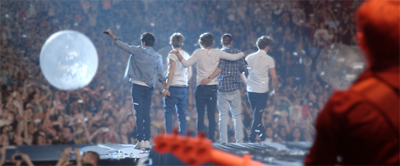
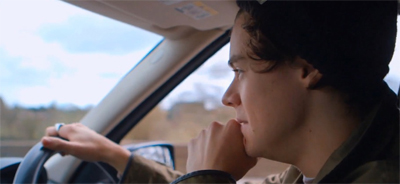
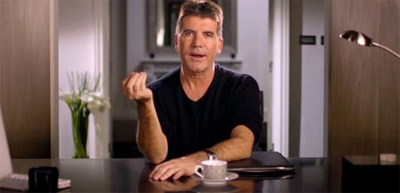
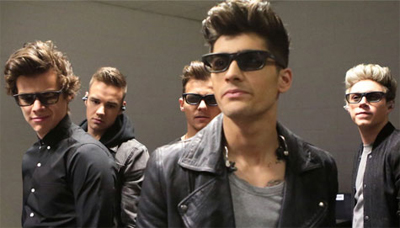
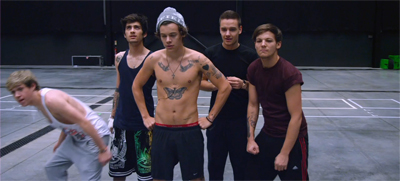
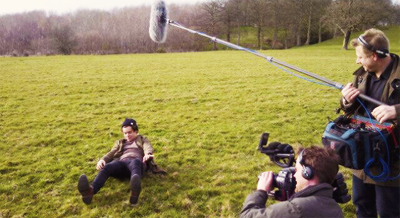





“Teenage Dirtbag” was written by Wheatus.
My first reaction on reading this was “I wrote that, didn’t I?” Then I checked, and it turned out I’d got me “Whe-“s mixed up. Corrected, thanks for the head’s-up!
Why the hell did Morgan Spurlock direct this?
I’m tempted to offer a very cynical answer, but I suspect it has to do with his willingness to be vaguely provocative and unpredictable. Spurlock seems to have a wonderful grasp of how to generate buzz and attention, which is not a bad thing. It’s a gimmick, just like The Greatest Movie Ever Sold or Supersize Me. And I don’t mean that disparagingly. It’s a way for him to generate attention, which is vitally important when you work in a medium as under-exposed as documentary film-making.
I am a One Direction fan and have actually just come home from watching the movie. I found your review extremely insightful and containing some really good points. I was also, myself, slightly disappointed because I thought as well that we would get to see the “real” boys, instead of them just being in these too safe, almost scripted scenes. I love them to bits and pieces and honestly I wouldn’t change a thing about them, but they don’t have much control over what they do because Modest! Managenment has got them on a very tight leash. There’s some really intense stuff going on behind the scenes; a world that cannot be exposed to the public because that is how the music industry works nowadays–or their perception of it, anyways. I also thought it was very “safe” and Spurlock, while directing wonderfully, didn’t take many risks and the movie stayed confined to only a limited amount of information, not wanting to “expose” the boys’ lives as much, I guess. I strongly agree with many of the points you said in your review, however I didn’t agree on your idea of One Direction as just another manufactured boyband. They’re so much more than that. They’re wonderful, amazing people who have changed, and saved so many thousands–even millions–of lives in the world. Maybe the movie didn’t exactly show that 100% of the time, and made them come off as “just another typical boyband,” but just because their management sucks doesn’t mean they do. Again, great review, even if it hurts me a little to read it because I love them so much and I want all the success in the world for them—as if they didn’t have enough already.
To be fair, I didn’t use the phrase “just another typical boyband.” Their success is impressive. And I am sure they are nice people. For what it’s worth, they all come across as generally decent folk in the footage here.
The problem, however is that they don’t feel real. I think describing the band as manufactured and maintained is fair – and it’s not a judgment on any of the lads involved. There’s nothing wrong with that – all showbiz is managed and maintained, and the skill with which the brand has been cultivated and maintained is impressive on a purely logistical level.
The rub is that it doesn’t make for an interesting film. The trick in any show like this is hiding the wires – maintaining the illusion of an organic exploration. Manipulate us without making us feel manipulated. (After all, at the risk of over-generalising, all cinema is about manipulating your audience to feel a particular way. The trick is making them forget that they’re being manipulated.)